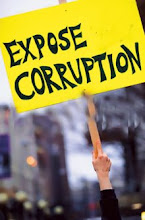How IT can help war on corruption...
Last weekend, over a candle-lit dinner at the Westview restaurant on the Maurya's rooftop in Delhi, Nandan Nilekani discussed with some of us the ins and outs of his ambitious book, "Imagining India," which is due to hit the markets this week. This tome is an effort by the co-chairman of Infosys Technologies - arguably the showpiece of reforming India - to turn an elder statesman in matters related to governance.
The scene was surreal, because we discussed poverty, corruption and such murky issues in a five-star ambience. Some loud Turkish music coming from the lawns provided a metaphorical contrast.
It is not easy to have a quiet dinner amidst the din, and it is not easy to carry big ideas, however rational and well-researched, into the hurly-burly of a huge society. But make no mistake, this dinner was no exercise in self-delusion or simple book promotion.
The well-researched book, in which Nilekani sounds more like a painstaking reporter or systematic programmer than an armchair intellectual, also provides valuable ideas on how information technology can turn the tide for the poor. Loaded with examples, Nilekani's book offers a blueprint in which IT can help fight corruption, reduce bureaucracy and make citizens empowered.
I have witnessed some as a journalist, such as the fingerprint-linked computerization of land records in Karnataka which has made it easy for farmers to get simple proofs of ownership and avoid exploitative encroachment. To my somewhat cynical question on how public-private partnerships (which he likes) can potentially over-ride transparency, he responded by pointing out to how IT can address it.
Nilekani recommends a "national grid" of information, much like interlinked power grids, and "national information utilities" (NIUs) which - functioning like the National Stock Exchange - can bring in transparency and ease of use. We had an example last week when the telecom regulator simply referred to its Internet site to answer a letter from the Central Vigilance Commissioner on questions about irregularities.
"NIUs would be databases that mass information, streamlining it for the government, and also making it more accessible and transparent for citizens," says Nilekani. "NIUs offer us a new kind of governance model - one that is scalable, with a single point of accountability, and where the amount of information available maintains a balance of power between the citizens and the government.
" Clearly, there is much more to IT than gizmos, corporate efficiency and software exports. And it has only just started.





